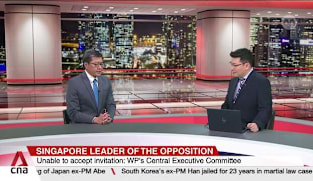Usha Chandradas on Insurance (Amendment) Bill
In putting a stop to the Income-Allianz deal, the Government was “courageous enough” to re-evaluate the situation, and quickly, when it realised that it had new information. However, Singapore must be careful not to send a message to the world that it is possible for carefully planned corporate deals to suddenly be overturned by the Government and for legislation to be rushed through. NMP Usha Chandradas made these points in Parliament on Wednesday (Oct 16). She raised several questions. How does the Government propose to mitigate the impact of such conclusions being drawn by investors and businesses, both domestic and foreign? Have similar incidents happened in the past and if so, were there defining factors on when the “public interest” is deemed significant enough for interventions like this? What does it mean for a licensed insurer to be required to “conduct its business prudently”, as stated in the existing Insurance Act? Could the Monetary Authority of Singapore, in evaluating the deal, have taken a “more expansive” view of the word “prudent”, given Income’s activities as a co-operative that provides financial services to the underserved and the special circumstances behind its journey to corporatisation? Ms Chandradas added that a more detailed explanation on the present limitations of the Insurance Act would help in understanding why the new amendments were so urgently required.
In putting a stop to the Income-Allianz deal, the Government was “courageous enough” to re-evaluate the situation, and quickly, when it realised that it had new information. However, Singapore must be careful not to send a message to the world that it is possible for carefully planned corporate deals to suddenly be overturned by the Government and for legislation to be rushed through. NMP Usha Chandradas made these points in Parliament on Wednesday (Oct 16). She raised several questions. How does the Government propose to mitigate the impact of such conclusions being drawn by investors and businesses, both domestic and foreign? Have similar incidents happened in the past and if so, were there defining factors on when the “public interest” is deemed significant enough for interventions like this? What does it mean for a licensed insurer to be required to “conduct its business prudently”, as stated in the existing Insurance Act? Could the Monetary Authority of Singapore, in evaluating the deal, have taken a “more expansive” view of the word “prudent”, given Income’s activities as a co-operative that provides financial services to the underserved and the special circumstances behind its journey to corporatisation? Ms Chandradas added that a more detailed explanation on the present limitations of the Insurance Act would help in understanding why the new amendments were so urgently required.



















